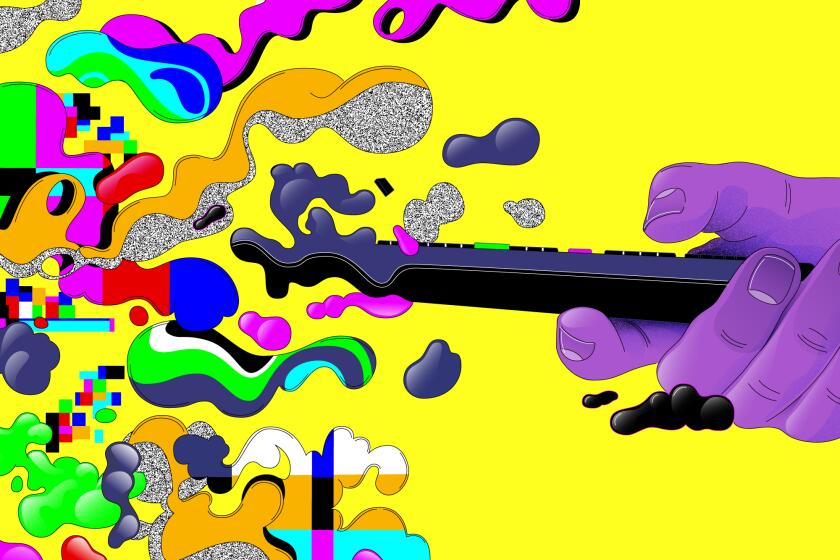Commentary: HBO’s ‘We Are Who We Are’ is the perfect TV show to mark the end of a lost summer
- Share via
Luca Guadagnino knows pleasure when he sees it. Smells it. Tastes or touches it.
With his “Desire Trilogy” of films — “I Am Love” (2009), “A Bigger Splash” (2015), “Call Me by Your Name” (2017) — and now the HBO series “We Are Who We Are,” the Oscar-nominated Italian director has established himself as our foremost chronicler of life’s voluptuous delights: cock’s crow and birdsong, cold drinks on hot squares, just-ripe stone fruit and salt-baked cod. At times, his work even appears to be woven from sense-memories, of your hand wandering along the nape of a handsome man’s neck or clasping a pouch of MDMA in a squalid bar bathroom. Guadagnino is “he that aches with amorous love,” as the teenage Cait (Jordan Kristine Seamón) recites Walt Whitman in “We Are Who We Are.”
Emphasis on the ache.
After all, for Guadagnino, there are no simple pleasures: Swimming beneath the surface of the carnal are other, more metaphysical desires. Emma Recchi (Tilda Swinton), the Russian émigré of “I Am Love,” may be transported by her young lover’s transcendent prawns or sudden touch, but she gives herself over to the film’s spotlighted reveries because of a yearning for selfhood. “Emma is not my real name. Tancredi gave it to me,” she reveals, referring to her wealthy industrialist husband. “I no longer know it.”
To kick off our 2020 fall TV preview, the Times TV team selects the 15 shows we’ll be watching this fall — and that you should be watching too.
When we lust after Paul (Matthias Schoenaerts) in “A Bigger Splash”— wearing a stretched-out gray tee on which you can practically smell the unholy ointment of sweat and sunscreen — or dream of Lake Garda’s perfect turquoise in “Call Me by Your Name” — where Professor Perlman (Michael Stuhlbarg) exhumes ancient sculptures from the sandy depths — we are experiencing more than want. We are also identifying with the characters’ wants and, by extension, their fears and their foibles. Longing for a partner or a parent, an escape or an exploit, is ultimately admitting an absence, however fleetingly you may feel it: It means you are lonely or orphaned, apprehensive or bored.
Look closely, and even the most primal moment in “Call Me by Your Name” echoes Guadagnino’s understanding of pleasure, which is anything but blindly hedonistic. The scene is famous for the image of Oliver, a graduate student summering in northern Italy, devouring a peach that Elio (Timothée Chalamet), his advisor’s teenage son, has used to masturbate. But in Guadagnino’s hands, the object is, if not incidental, at least intangible — it’s the rare occasion on which he resists the wanton close-up. Instead, the focus turns to Elio’s shame, and Oliver’s refusal to accept it; here, as elsewhere in the director’s oeuvre, the point is not self-indulgence but self-discovery, or self-realization.
“I’m sick, aren’t I?” Elio worries.
“I wish everybody,” Oliver replies, “was as sick as you.”
It’s against this backdrop that Guadagnino, with collaborators Paolo Giordano, Francesca Manieri and Sean Conway, delivers “We Are Who We Are,” premiering Monday on HBO: an intense, exhilarating queer melodrama that evolves, recombines and finally crystallizes its director and cowriter’s pleasure principle into one of the year’s best TV series.
Set on a U.S. military base in Chioggia, Italy, on the Adriatic coast just south of Venice, “We Are Who We Are” stars Seamón and Jack Dylan Grazer as Cait and Fraser, a pair of Army brats who form a close platonic bond after Fraser’s mom, Sarah (Chloë Sevigny), assumes command of the outpost, where Cait’s father, Richard (Scott Mescudi, a.k.a. Kid Cudi) is stationed. That it shares a common artistic ancestry with Guadagnino’s earlier efforts is clear from the first bleat of Devonté Hynes’ electric music — a nod, perhaps, to the John Adams compositions that define the “Desire Trilogy” — and echoes in its euphoric pop cues, its poetry, its heat, its lingering appreciation for the male form.
“We Are Who We Are” resides just a handful of towns over from the Italy of Guadagnino’s previous work, with its mountaintop vistas and rambling villas. Yet the sun is more forbidding here, the facades more utilitarian, the streets and sands bleached as if by the American presence; in the teens’ frenzied carousing, as in Cait and Fraser’s often brutal relationships with their parents, there is a sense of desperation that is more than slightly unsettling.
“Last year, we had 20 brawls, three rapes and two suicides,” the departing colonel tells Sarah forebodingly at a ceremony to mark the start of her tenure. “Good luck with all that, sweetheart.”
Guadagnino, of course, has known all along that pleasure’s other complicating factor is context, broadly defined — and “We Are Who We Are” underscores the notion that no desire can be fulfilled, no want met, on an indefinite basis, or at no cost. The other shoe is always about to drop.
In “I Am Love,” we discover that the Recchi fortune was first amassed in anti-Semitic collaboration with the fascists, and Emma’s infidelity, once discovered, sets off the family’s disintegration — the subject of the film’s heart-stopping denouement.
“Call Me by Your Name,” set in the same year that the New York Times published its first front-page story about the AIDS crisis, concludes with Elio crying before a fire, as much for the sacrifices his father and former lover have made to heteronormativity as for his own broken heart.
And long before “A Bigger Splash” turns one of Guadagnino’s favorite visual motifs — the pool — into the site of a killing, it sets its delights against a much larger crime. While vacationing on the remote isle of Pantelleria, poised in the strait between Sicily and Tunisia, rock star Marianne (Swinton) and her ex, Harry (Ralph Fiennes), drop in on an aging woman to taste her homemade ricotta. Look closely, though, and even the simplest pleasure is tainted by the fallen world in which it’s enjoyed: As satisfaction passes across their faces, a television report describes the harrowing journey of refugees from the Middle East and North Africa, sailing in flimsy fishing boats for the European coast and held in cages when they arrive.
With profound change comes possibility: As we enter the 2020 fall season, TV has not only the opportunity, but the need, to do so. Here are some ways it might.
Perhaps it is the series’ acknowledgment of impending disaster, then, and not the bliss of midnight ziplining or seaside Peronis or reading Ocean Vuong in a flat-bottomed boat, that renders “We Are Who We Are,” like Guadagnino’s work in general, so suited to our own annus horribilis. As Harry says in “A Bigger Splash”: “We’re all obscene. Everyone’s obscene... We see it and we love each other anyway” — and every tiny joy I’ve experienced this year, from afternoons reading Edna O’Brien on the beach in Malibu to growing herbs and grilling on my roof deck in Palms, has had hanging over it a sense of obscenity. “People are dying,” I have thought more than once, “and here I am having fun.”
Set in 2016, with clips of a Trump campaign ad and Hillary Clinton’s speech at the Democratic National Convention for emphasis, “We Are Who We Are” contains at least one occasion that captures the same ambivalence: an all-night wedding bacchanal, with the groom due to ship off to Afghanistan the next morning. It’s so suffused with Guadagnino’s sense of ill-fated romance that it reads as nostalgic for a moment that has yet to pass, and shadowing it all is the acknowledgement that pleasure and pain, ecstasy and dread, orbit each other and collapse together, like binary stars.
For the young soldier soon to find himself in harm’s way, for his friends left behind to that irrevocable summer and for viewers nearing the end of our own, nostalgia is the last and most potent of Guadagnino’s not-so-simple pleasures. In his hands, it is not only the desire to return to a time or a place we felt happy — it is also a premonition, or perhaps a warning:
Enjoy it while it lasts.
'We Are Who We Are'
Where: HBO
When: 10 p.m. Monday
Rating: TV-MA (may be unsuitable for children under the age of 17)
More to Read
The complete guide to home viewing
Get Screen Gab for everything about the TV shows and streaming movies everyone’s talking about.
You may occasionally receive promotional content from the Los Angeles Times.








